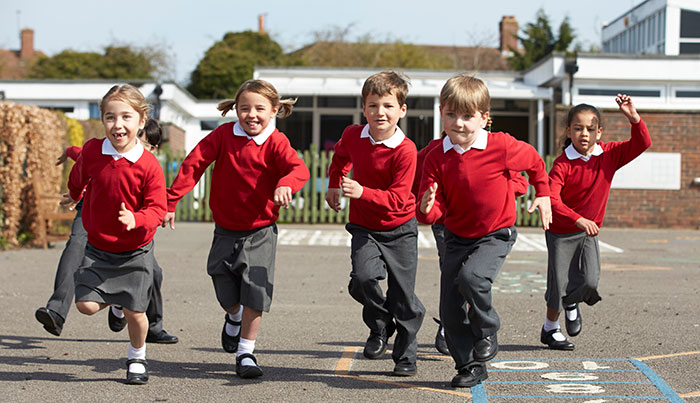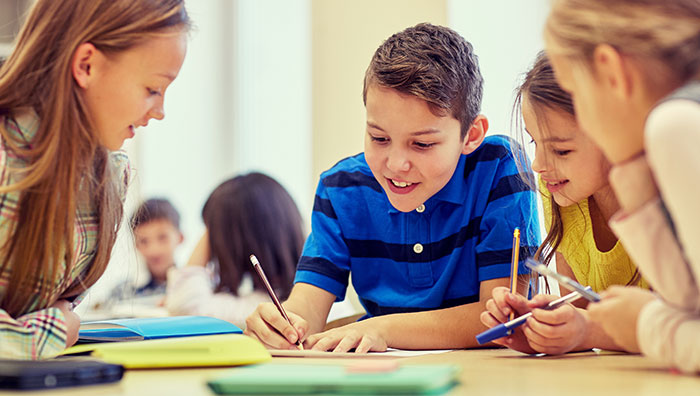On this page:
- List of schools
- Facts about primary school education in Poland
- Types of private primary schools
- Benefits of private primary schools
- Choosing a private primary school

Facts about primary school education in Poland
Primary schools (szkoła podstawowa) in Poland tend to have some common traits. Many private and public primary schools have similar guidelines. Below, we describe some of the main ones.
Age range
Children must attend primary school (private and public) from the age of 7 to 13. They normally attend primary school for six years in total.
Curriculum and skills learned
Different primary schools have different learning objectives. Most schools, though, aim for your child to acquire several key skills.
- Literacy: reading, writing, and self-expression
- Math: arithmetic and geometry
- Social skills: cooperation, sensitivity, and problem-solving
- Arts: creativity, aesthetics, and art appreciation
- Morality: understanding of ethics and values
- Civics and community: understanding of oneself as an individual and a member of a family and society
- History and culture: understanding of cultural, historical, national, and ethnic issues
The school day
In most schools, the day starts between 8am and 9am and ends between 2pm and 3pm. Normally, several lessons are given throughout the day. These are around 45 minutes long with with 5 or 10 minute breaks in between. Lunch is usually around 30 minutes
Grade levels
According to Alberta’s Poland International Education Guide, primary education is often divided into two stages. The first stage (I Etap), Grades 1 to 3, is called integrated education. In this stage, teachers create a schedule, with a flexible timetable and breaks, and monitor educational rogress. This stage often involves the planning of as many as 18 lessons per week, including three hours of physical education.
Activities and subjects for stage 1
(based on Alberta’s Poland International Education Guide)
| Activities and subjects | Cumulative hours per week in three years |
|---|---|
| Integrated teaching* | 54 |
| Religion/ethics | 6 |
| Hours at the principal's discretion** | 12 |
| Total | 72 |
* Combines elements of language arts, arithmetic, natural sciences, social skills, and the fine and performing arts.
**Since September 2008, six hours are devoted to foreign language.
The second stage (II Etap) covers Grades 4 to 6. At this stage, teaching is arranged by subjects and provided by individual teachers. In addition to subjects, the curriculum recommends “educational paths” (sciezki edukacyjne), such as reading, media, ecology, and health and social education.
Activities and subjects for stage 2
(based on Alberta’s Poland International Education Guide)
| Subjects | Cumulative hours per week in three years |
|---|---|
| Language arts | 16 |
| History and social studies | 4 |
| The arts (music and/or visual arts) | 4 |
| Modern foreign language | 8 |
| Math | 12 |
| Natural science | 9 |
| General technical subjects | 2 |
| Computer science | 2 |
| Physical education | 12 |
| Lessons with the homeroom teacher | 3 |
| Religion/ethics | 6 |
| Hours at the principal’s discretion | 9 |
| Total | 87 |

Types of private primary schools
There are many different kinds of private or non-public primary schools in Poland. These schools can differ in terms of teaching philosophy, focus, and more. It’s important to choose a school that’s right for your child.
- Montessori schools: These schools are student-centred with a strong focus on self-directed learning. Montessori teachers connect children with meaningful work that challenges them, but rarely provide lectures.
- Waldorf schools: These schools focus on the whole child. They educate your child’s intellectual, practical, and artistic sides.
- Special needs schools: These include schools with programs for children with learning, developmental, and physical disabilities.
- Gifted schools and programs: These provide enrichment and acceleration programs to students who are well above average in academics.
- Boarding schools: These can be an option for international and English-language students.
- International schools: Most of these offer room and board. They can be a great option for international students from North America, Europe, and other continents.
- Language schools: There are Polish and English primary schools (sometimes called “international preschools”). There are also bilingual, English-Polish primary schools.
Benefits of private primary schools
There are lots of reasons to send your child to a private primary or elementary school in Poland. As we all know, the early years, including the primary years, from 7 to 13, are critical to a child's development.
Of course, private school is a big commitment. It’s a big investment of time, energy and resources. That said, there are lots of advantages to sending your child to a non-public primary school.
- Small classes: Many primary schools (private and non-public), not to mention secondary schools, have small classes and lower teacher-to-student ratios. This can make for a warm, caring, and supportive environment.
- Individualized instruction: Many private primary or elementary schools offer tailored programming for your child. This enables them to address your child’s specific strengths and weaknesses.
- Strong teachers: Private schools tend to have highly skilled teachers with great credentials. The vast majority of teachers are also enthusiastic and dedicated to their work.
- Safety: Private schools have reputations for maintaining high standards for safety, discipline, and respect. Lower staff-to-student ratios allow for more effective observation and control of school grounds.
- Community: Private schools tend to have a strong community feel and environment. They also offer rich networking opportunities in school and in the work world.
- Resources: At private schools, you’ll find incredible resources to support student learning in the classroom, sports field, art studio, and beyond. Quality resources and extracurriculars provide students with the opportunity to fully explore their interests and talents.
- Feeder schools: Many private primary and elementary schools are linked with junior high and high schools. These “feeder schools” ease the potentially difficult transition between schools. They may also help pave the way to gaining admission to a prestigious high school or university in the future.
Choosing a private primary school
Narrowing down a list of private schools may seem overwhelming. But choosing the right school doesn’t have to be a stressful process.
Here are some tips:
- Consider your child’s needs and how certain types of schools might benefit them.
- Research those schools and involve your child in the process.
- Visit school websites.
- Plan to visit the school for a private tour or during their open houses. Bring your child along, if possible, to experience the atmosphere.
- Prepare some questions to ask school officials and current students, as well as the parents of current students.
- Create a shortlist of a few schools your family is interested in applying to and go from there.
Also, consider the following questions:
- How much is tuition? Do you think it offers good value? Are there any hidden costs (e.g., field trips, uniforms, lunches, etc.)?
- How close is it to your home? Are there bus services or public transportation to make the daily trip reasonable?
- What is the school’s average class size? How many students are enrolled there?
People who read this also viewed:
- Private primary schools in Warsaw
- Social primary schools
- Private bilingual elementary schools in Warsaw
- Poland education: grade levels
- Our Kids Interview: Get to know The English Playhouse and The English Primary
- Our Kids Interview: Get to know FSA School
- Our Kids Interview: Get to know Polish British Academy of Warsaw
- Our Kids Interview: Get to know English Montessori School Katowice
-
Advice Guide
- ABC of educational terminology: Glossary of terms and concepts
- The admissions process
- Advantages and disadvantages of studying in an international school
- The application process
- Benefits of Polish private schools
- Bilingual schools
- Boarding schools
- Choosing a private or nonpublic school in Poland
- Compare schools in Poland
- English schools in Warsaw
- Homeschooling
- International schools in Kraków
- International schools
- Private school interviews
- Music education
- Myths about private education
- Non-public schools in Poland
- School open houses
- Our Kids Interview: Get to know EF Academy Oxford
- Our Kids Interview: Get to know Open School
- Our Kids interview: Get to know Regent College International Schools
- Our Kids Interview: Get to know The American School of Warsaw
- Our Kids Interview: Get to know The British School Warsaw
- Our Kids Interview: Get to know Wrocław Cosmopolitan School (two interviews, new video)
- Poland school profiles
- Private day schools
- Gifted schools & programs
- Private Jewish schools in Poland
- Language schools
- Private school tuition and costs in Poland
- Private schools in Poland
- Private schools in Poland offering French-language immersion
- English immersion schools
- Poland school uniforms
- Private special needs schools in Warsaw
- Public versus non-public schools in Poland
- Private school questions
- Private school rankings
- Reasons for choosing private schools - Our Kids’s survey report
- Religious schools
- Schools and classes for children with ADHD in Poland
- Social primary schools
- Social Schools
- Special educational needs (SPE) certificates
- Special needs schools
- Study abroad at a private school
- The first annual non-public school fair in Poland
- The first annual Our Kids non-public school expo in Warsaw was a great success
- Third Private School Expo in Warsaw - summary
- Types of schools
- Types of schools in Warsaw
- Warsaw preschool costs
- Why private school?
- Why parents go private
-
Grades
- Boarding high schools
- Choosing a high school in Poland
- Mokotow High School Campus - a new Warsaw high school and Thames British School campus
- Montessori nursery schools
- Montessori preschools
- Our Kids Interview: Get to know English Montessori School Katowice
- Our Kids Interview: Get to know FSA School
- Our Kids Interview: Get to know KIDS & Co.
- Our Kids Interview: Get to know Polish British Academy of Warsaw
- Our Kids Interview: Get to know The English Playhouse and The English Primary
- Poland education: grade levels
- Preschools in Warsaw
- Private & non-public preschools
- Private & non-public primary schools
- Private bilingual elementary schools in Warsaw
- Private high schools
- Private high schools in Warsaw
- Private middle schools
- Nursery schools
- Private primary schools in Warsaw
- Social high schools
-
Locations
- Boarding schools in Warsaw
- English schools in Kraków
- International Baccalaureate (IB) schools in Warsaw
- International schools in Warsaw
- Montessori schools in Warsaw
- Non-public schools in Warsaw
- Our Kids Interview: Get to know EF Academy
- Our Kids interview: Get to know Excellence in Education better
- Our Kids Interview: Get to know PRIMUS Non-Public Primary School No. 47 and Non-Public Secondary School
- Our Kids Interview: Get to know the Canadian School of Warsaw
- Our Kids Interview: Get to know The Primary and Secondary Schools of the Sisters of Nazareth in Warsaw
- Private Catholic and Christian schools in Warsaw
- Private day schools in Warsaw
- Private language schools in Warsaw
- Private schools in Bialystok
- Bydgoszcz schools
- Częstochowa schools
- Private schools in Gdańsk & Gdynia
- Katowice schools
- Private schools in Krakow
- Lublin schools
- Olsztyn schools
- Private schools in Poznań
- Private schools in Rzeszów
- Szczecin schools
- Private schools Warsaw
- Private schools in Wrocław
- Zielona Góra schools
- Private schools in Łódź






























 POL
POL CAN
CAN